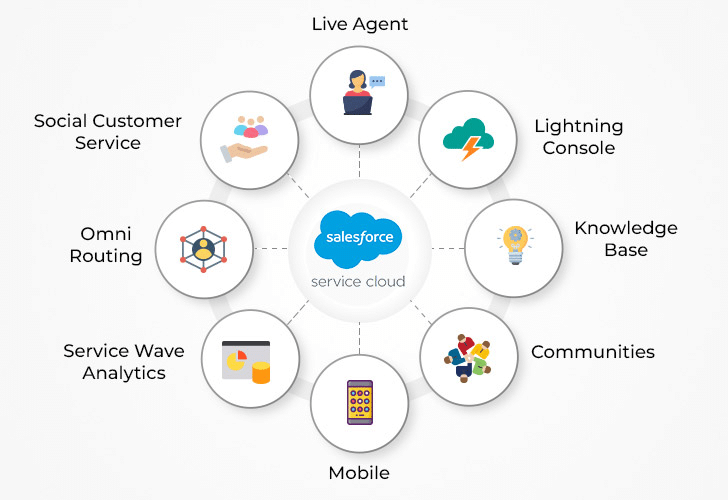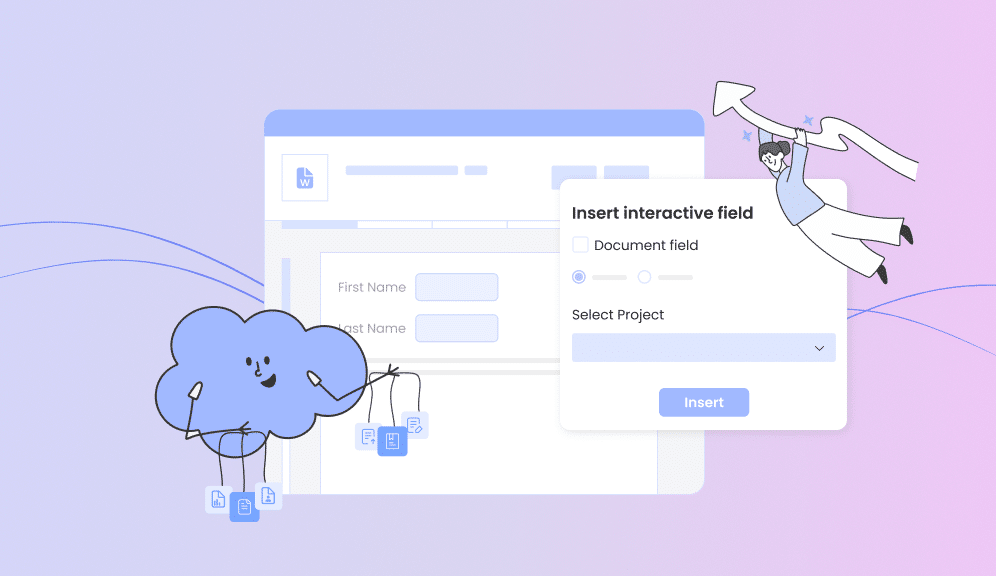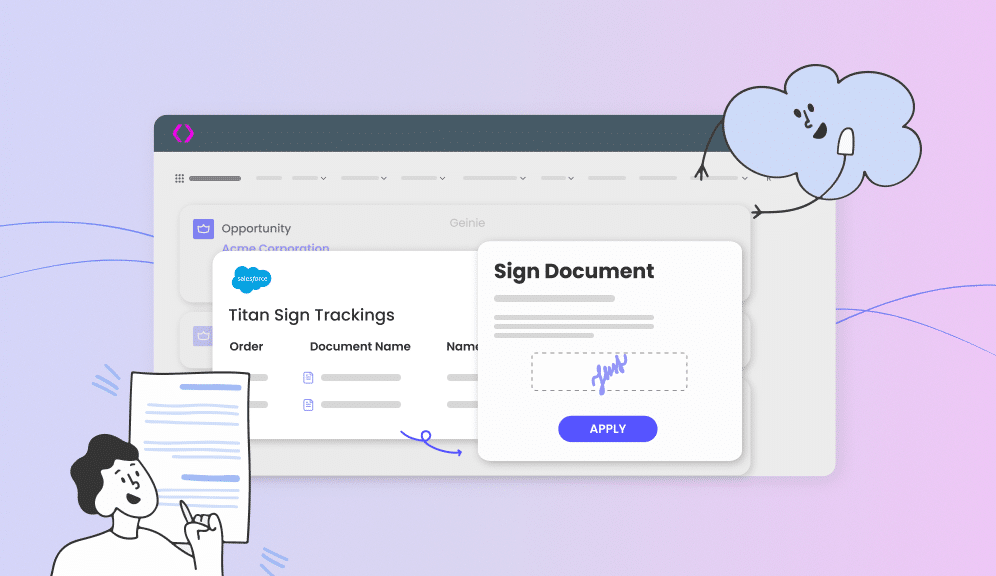Salesforce Service Cloud Features and Capabilities
Customer service agents often struggle to do their tasks well when they have disconnected software systems. This means that their work tools are in different applications or programs. So, finding and using them to work with essential information is time-consuming and can frustrate customers who want problems resolved fast.
For this reason, we would like to inform you about Salesforce Service Cloud. This intelligent platform is dedicated to customer service teams and can reduce annoyances in the workplace or in the field while supporting teams with AI-powered tools that resolve customer issues faster than ever.
Let’s get started!
What Is Service Cloud In Salesforce?
Service Cloud is a versatile Salesforce product designed to automate manual processes, speed up service tasks, and help agents quickly find the information they need.
If you already have Service Cloud integrated into your tech stack and want to extend your Salesforce cloud services, we recommend you check out our no-code platform.
But for those who want to know more about the world’s leading Service Cloud CRM platform, keep reading. We are about to uncover some of the most popular features of Service Cloud from Salesforce.
Salesforce Service Cloud Features
Salesforce gives us Service Cloud with a Lightning Console full of tools. It allows businesses to scale more easily by automating and optimizing processes for teams. Let’s take a look at some of the Service Cloud features customer service teams can utilize, whether they work at a contact center or directly in the field.

Case Creation, Assignment & Tracking
Service Cloud makes creating, assigning, and tracking cases easier for agents with its Omni-Channel feature. For example, a customer service team can use Omni-Channel Routing model to automatically route cases to specific technicians rather than asking a manager to do so.
Omni-Channel Routing model is intelligent enough to get the job done correctly, as it can achieve the following:
- Assign a case to an available agent.
- Assign a case to an agent that has the right skills to resolve an issue.
- Assign a case on a high or low level of priority.
Therefore, by using Omni-Channel Routing, support teams can respond faster to customer requests. Additionally, cases can be resolved faster as they are assigned to the most relevant agent to handle. Meanwhile, the team manager can track the entire case process and service delivery from Service Cloud.
Omni-Channel Routing
Managing cases is not the only thing that the Omni-Channel feature can do for customer service teams. This versatile Service Cloud feature is also useful for balancing the workload of a customer service team. Omni-Channel examines each customer service agent’s availability, their capacity, and then, allocates work fairly.
This setup makes sure that no one on the team is overloaded with work and in this way reduces employee burnout.
Knowledge Management
Salesforce Knowledge is the ultimate support feature for customer service teams. With it, admins build and manage a repository, also known as a knowledge base, where teams can store and share company documentation such as:
- Insightful Articles
- Answers to Frequently Asked Questions
- Customer Success Stories
- Process Guides
With a knowledge base available to support agents, they can quickly search for articles and guides in the Service Console or a self-service portal to instantly resolve customer issues.
Service Console
The next Salesforce feature that agents can take advantage of with Service Cloud is the Lightning Service Console. It’s a workspace where customer service teams can manage cases digitally. Here are a few points to show how the Lightning Service Console can support teams with resolving customer queries faster than before.
A Single Platform for All Customer Data
Agents can use the Lightning Service Console to view all of a customer’s data in a single place. This helps an agent stick to one program while performing customer service. So, by upgrading to storing customer data in a single location, agents do not need to hunt additional information by logging into different systems.
In this digital age where customer and business data needs to be kept safe with passwords and 2-factor authentication methods, it makes sense to keep all data in a single location. This is especially true when you need to resolve a customer issue fast, as logging into various systems can slow down the entire case resolution process.
Tools for Managing Cases
The Lightning Service Console houses all the tools agents need to create and manage cases. Some of the tools they have direct access for tracking and resolving cases include:
- Macros
- Quick Text
- Email Integration
Integrations
The Lightning Service Console automatically tracks work items in real time. This capability makes the lives of customer service agents that much easier, as it sends them updates on tasks and prioritizes work for the entire team that comes in from communication channels, such as:
Live Agent Chat
Service Cloud has the Live Agent Chat feature to boost customer satisfaction levels. It works by providing customers with real-time support via an online chat system.
Here are some of the results a customer support team can gain from integrating a Live Agent Chat system into processes:
- Chat boxes (dedicated to customer support) can be integrated into a company’s website or mobile app.
- Customers can use the chat box to instantly communicate with a service agent instead of waiting in a queue at a store or being put on hold when calling through a phone line.
- The service agent can help many customers simultaneously by responding to multiple chats.
- The Live Agent Chat provides the ability to create pre-written responses so that agents can resolve queries faster with clicks instead of typing.
- Service agents can access information from Salesforce while chatting with customers to create personalized and meaningful interactions.
Telephony Integration (CTI)
Businesses that have a call center can use the Open CTI feature from Service Cloud to link their third-party computer-telephony integration (CTI) systems to Salesforce. Once this configuration is set up, service teams can communicate better with customers while working optimally in a single location.
For example, hooking phone systems to Service Cloud helps customer service teams with handling calls, such as:
- Making Calls to Customers.
- Receiving Calls from Customers.
- Transferring Customers to Appropriate Subject Matter Experts.
- Logging Calls in the Service Console.
Of course, customer service agents will also have access to Salesforce data. As they are interacting with a customer on a call, Service Cloud will automatically display the information they need to resolve a case, such as:
- Customer’s Account Details
- The Customer’s Interaction History
Self-Service Communities
Although Service Cloud has many features to automate tasks for customer service teams, these professionals might still have a heavy workload depending on the nature of their operations. Another way to alleviate their workload is to use the Self-Service Communities feature from Service Cloud.
With the appropriate tools, an admin can build a Salesforce Service Cloud customer portal. These online platforms give customers an opportunity to resolve their own product issues by providing answers to frequently asked questions. Additionally, customers can access the following services on a company’s custom-branded portal:
- A Knowledge Base
- Community Forums
- A System to Log and Track Cases
- Quickly Find Product and Service Recommendations with Einstein AI Features
- Interact with the Company From any Location Via Mobile Devices
Field Service Management
As we know, customer service operations can also extend to on-site support. Service Cloud offers Salesforce Field Service to businesses that manage tasks and resources for agents providing on-site assistance.
For example, with Field Service’s management features, technicians are automatically assigned the right cases. This is because Field Service can assign cases to a technician based on:
- The skills they possess.
- The location in which they work.
- Whether they are available to work on a particular day.
By using Field Service to automate the scheduling of appointments for field technicians, the customer service team gets an optimized process while customers get their issues resolved by the most qualified professionals.
Automation & Workflow
Appointment scheduling is not the only workflow process that Service Cloud can automate. Service Cloud also assists customer support teams with tracking inventory, such as:
- Equipment
- Tools
- Parts
This service ensures that technicians who are involved in customer support always have the resources they need to complete their jobs efficiently and timeously.
Social Customer Service
Businesses will often find customers posting opinions or grievances on their social media platforms. With Service Cloud, customer support teams can view these issues and respond directly to customers on these social media platforms, like:
- X, previously known as Twitter
Once again, this advanced feature from Service Cloud allows customer service agents to perform their duties quickly while interacting with customers, all from a single location.
Customer Feedback and Surveys
Like our product Titan Surveys, Service Cloud has a feature for teams to integrate Salesforce Surveys into Service Cloud. With this integration, teams can build surveys and use them to collect customer feedback. Then, with the customer responses stored in Salesforce, the appropriate teams can analyze the data and generate reports that are used for improving services.
New Solutions for Your Customer Service Teams
That’s a wrap on our article covering Salesforce’s Service Cloud. In it, we discussed Service Cloud’s features and how they could assist customer service agents in speeding up common work tasks.
If you are interested in a specific feature that we haven’t mentioned, please feel free to reach out to us on one of our social media channels below. We would love to continue the discussion.
Don’t Miss Out on No-Code Solutions for Salesforce
As powerful as Salesforce is, if you want tailor-made solutions for your business operations, you need to invest in hiring custom development that also requires on-going maintenance. However, if you want to build Salesforce processes lightning-fast without writing a single line of code, we suggest you check out Titan.
Our no-code platform integrates directly into Salesforce with just clicks. Then you can build any web project you can imagine that is connected to Salesforce for bi-directional data flows. We can give your customer service teams the power to build dynamic forms, portals, pre-filled documents, and surveys with a range of question types to collect essential customer data for Salesforce.
However, Titan is more than just a no-code builder. It can also streamline any business operation by fully automating manual processes from start to finish. From approval workflows to managing documents in a contract lifecycle, Titan can supercharge processes at speed and scale.
For more information on our no-code tools for Salesforce, contact us through one of our social media channels below.
See you soon!
Disclaimer: The comparisons listed in this article are based on information provided by the companies online and online reviews from users. If you found a mistake, please contact us.
You might be interested in
Writing Your First Notarized Letter Like a Pro

How to Remove Track Changes in Word

Signee Vs. Signer Vs. Signatory: What are They?

All-in-One Web Studio for Salesforce


